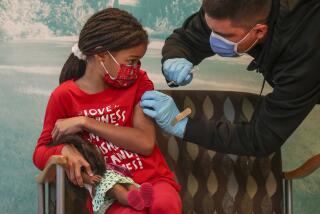Debating Depression Therapy in Kids
- Share via
Many people accept the idea of placing a child on medicine to control unruly behavior. But mention an antidepressant and just watch the jaws drop.
“I tell parents that depression is a no-fault brain disease,” said Dr. Harold Koplewicz, director of the Child Study Center at New York University Medical Center. “Once they understand the concept, I explain how the new antidepressants have helped enormously in the treatment of anxiety and depression. It’s not a ‘feel-good medicine.’ We’re not drugging kids instead of figuring out the root cause of depression.”
Koplewicz said the most important thing is making sure the child’s illness is correctly diagnosed. Today’s debate is not about whether children can be depressed, but about the best way to treat them: drugs, therapy or both?
The rigors of psychiatric drug research have seldom included children. Indeed, four out of five medicines listed in the Physician’s Desk Reference have not been tested in younger people. (Once a drug is approved by the U.S. Food and Drug Administration, doctors can prescribe it for anybody.)
President Clinton recently announced a plan that would require drug firms to test whether medicines are safe and effective for kids.
FDA officials also are concerned that the use of antidepressants in children is on the rise, with little information available about that use. The agency is urging drug companies to start studies.
Also, the National Institute of Mental Health has just supported the opening of three child psychopharmacology centers--at Columbia University’s College of Physicians and Surgeons, Johns Hopkins Medical Institutes and the University of Pittsburgh. These centers will conduct medication studies on children with depression and anxiety disorders.
Dr. Peter Jensen, chief of the NIMH’s child and adolescent research branch, said fewer than 500 children have participated in trials, and most of the studies were too small to show differences between drugs and placebos.
Still, in 1994, 200,000 prescriptions for Prozac and 300,000 for Zoloft were filled for children 5 to 10 years old. An additional 150,000 prescriptions for Zoloft and an equal amount for Prozac were filled for adolescents.
The first large-scale study of Prozac in children is about to be published in the Archives of General Psychiatry. Dr. Graham Emslie of the University of Texas studied almost 100 children and found a significant difference between those taking Prozac for up to eight weeks and those swallowing a placebo. According to Emslie, 58% did well on medicine, compared with 33% on a placebo.
“This is what we’ve been waiting for,” said NYU’s Koplewicz. “Scientific proof to confirm what we’ve been seeing in our clinical practice with children.”
The popular medicine’s makers--Eli Lilly & Co.--will use the data to petition the FDA to use the drug in children and adolescents. So far, no drugs have been approved for depression in people under 18. But a few months ago Georgia-based Solvay Pharmaceuticals received approval for Luvox, the first selective serotonin re-uptake inhibitor, or SSRI, for obsessive-compulsive disorder in children.






